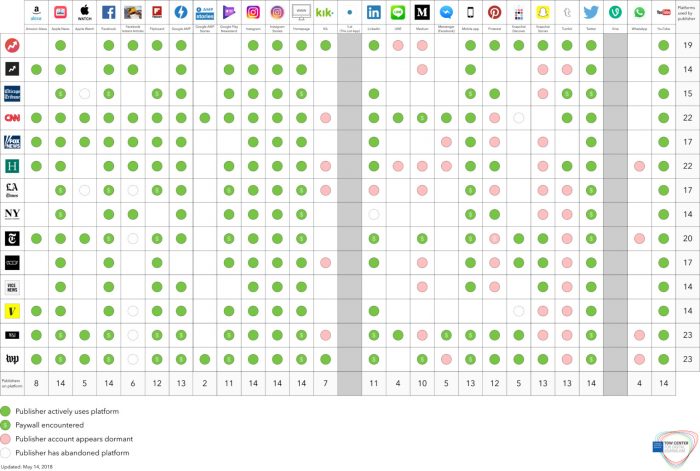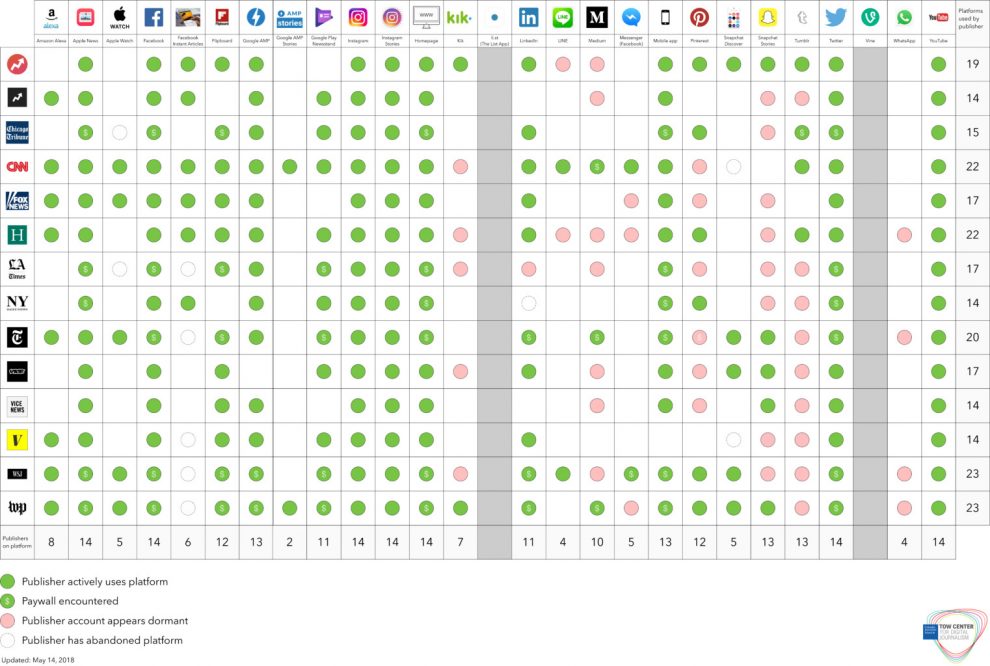
Gather round for this history of the troubled, not totally requited relationship between news publishers and powerful technology companies like Google and Facebook.
No publisher wants to be reliant on a platform that isn’t within their control, but few want to miss out, either — whether it’s on free(ish) money from Facebook to produce exclusive videos, or trainings from Google, or the promise of making money from readers subscribing on Apple News.“Platforms don’t always reward the best behavior,” one publisher told the researchers at the Tow Center for Digital Journalism at Columbia University in a new report on platforms and publishers, out Thursday. “So you can end up in a rabbit hole where you look at your product in the rearview mirror and think, ‘Is that what I intended to create?’”
The 23,721-word report, which is the culmination two years of interviews, publishing data, and tracking of platform developments, is worth scanning on your own if you have some time (the Center has been teasing bits and pieces of this work for some time, so some findings may feel familiar).
“Facebook always puts out a fat mic: ‘We’re here for you, we’re here for journalists,'” one local news publisher told the researchers. “But ultimately getting in touch with them is very difficult. Getting a straight answer out of them is difficult.”
Contradictions abound. Around half of the working journalists surveyed said they felt social media platforms like Facebook have “strengthened the relationship with their audience.” Meanwhile, 86 percent of them felt that social media was in part responsible for the public’s declining trust in journalism, Tow researchers found.
The researchers found that The New York Times, Vox, and The Washington Post have dramatically scaled back what they post natively to Facebook. (Remember that three years ago, the Washington Post said it would “send 100 percent of its stories to Facebook so that all Washington Post content can be formatted as Instant Articles, giving readers a lightning-fast user experience for reading, sharing and commenting within the Facebook iOS app.”) Once upon a time, the majority of the content these three organizations were posting to Facebook was Facebook-native (e.g., native video, Facebook Lives, Instant Articles). But:
All three of these publishers did an about-turn in their approach to Facebook native content. The New York Times was the first to go cold on Facebook — the proportion of Facebook-native posts had fallen to 19 percent by February 2017.
Next was The Washington Post, whose native posts fell from 97 percent in May 2017 to 20 percent in August.
Finally, Vox’s plummeted from 87 percent in August 2017 to 19 percent in November 2017.
In each case, the proportion of native content reached an all-time low for the publisher by the time of our final analysis in March 2018.
Note, however, that in the time period during which researchers collected data, the news organizations being tracked were still posting a lot to third-party platforms:

Following an unsurprising spike during the week of the US election (week beginning November 7, 2016), when a combined total of almost 25,000 items were posted, the number of posts pumped out to platforms remained remarkably consistent. The 12 publishers in our study typically posted a combined total of about 22,000 items per week — an average of 1,800 each — during each phase of data collection.
The consistency and sheer volume of content being posted to platforms highlights these publishers’ ongoing commitment to meeting their audience where it is — even though it’s on somebody else’s turf.
Smaller, regional-focused outlets that the researchers looked at posted to fewer platforms — almost exclusively Apple News, Facebook, and Twitter. By March 2018, the most recent sample period the report examined, just one percent of posts made by the Chicago Tribune, the Los Angeles Times, and the New York Daily News were posted somewhere other than Apple News, Twitter, or Facebook. Larger national news organizations have more resources and often more access to platform reps and more of a heads up on product launches: “Of the 12 news outlets we tracked over an 18-month period — CNN, Fox News, The New York Times, The Wall Street Journal, The Washington Post, Chicago Tribune, Los Angeles Times, New York Daily News, BuzzFeed, BuzzFeed News, HuffPost, and Vox — the larger, better-resourced publishers consistently posted more content to a greater range of platforms.”

All 23,721 glorious words of the report, complete with some great charts, are available here.